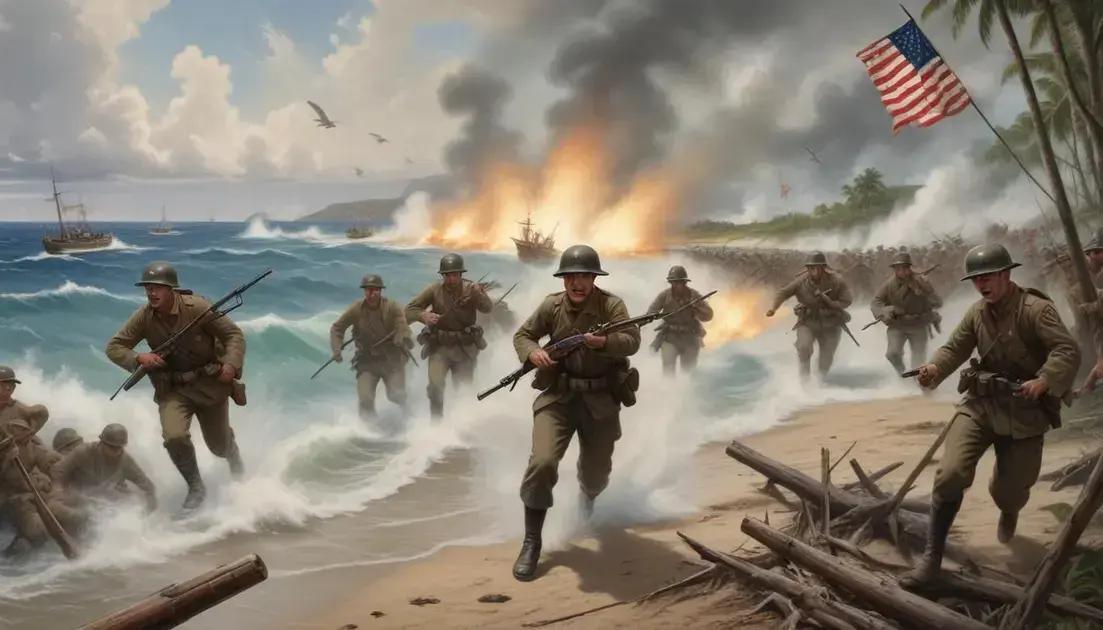
Spanish-American War: The Birth of the USA as a Global Power
The Spanish-American War in 1898 marked a significant shift in U.S. foreign policy, transforming America into an imperial power. Resulting in the acquisition of territories like Puerto Rico, Guam, and the Philippines, the war led to a more active role for the U.S. on the global stage. Key battles such as San Juan Hill showcased American military strength, while the legacy of the conflict prompted ongoing debates around imperialism and America’s international engagement strategies.
The Spanish-American War marked a pivotal moment in history, transforming the United States into a global power. Have you ever thought about how a brief conflict could reshape a nation’s destiny?
Background of the Spanish-American War
The Spanish-American War started in 1898 and changed the course of history. It was a conflict fought between the United States and Spain. One big reason for the war was the growing tension over Cuba. Cubans were fighting for their independence from Spain. Many Americans were outraged by news of Spanish cruelty toward the Cuban people.
Another important factor was the explosion of the USS Maine in Havana Harbor. This incident pushed the U.S. closer to war. Many people believed Spain was responsible for the explosion, even though the cause was not clear.
The war lasted only about four months. During this short time, the U.S. won several quick victories. They defeated Spanish forces in battles in Cuba and the Philippines. These victories helped the U.S. gain control of key territories.
After the war, the U.S. emerged as a new world power. They now controlled places like Puerto Rico, Guam, and the Philippines. This marked a significant change in U.S. foreign policy, moving from isolationism to a more active role on the world stage.
Key Battles and Events
The Spanish-American War had several key battles that shaped its outcome. One of the earliest battles occurred in Cuba at San Juan Hill. U.S. troops, led by Theodore Roosevelt and the Rough Riders, charged uphill and captured the position. This victory helped boost American morale.
Another significant battle took place in the Philippines. At the Battle of Manila Bay, Commodore George Dewey led the U.S. Navy to a swift victory against Spain. His fleet destroyed the Spanish fleet in just a few hours.
The war was not only fought on land. The naval battles showed the power of U.S. sea forces. These victories shifted the balance of power from Spain to the United States.
Following these battles, the fall of Santiago de Cuba marked the turning point in the war. The U.S. forces besieged the city, leading to its surrender. This event effectively ended Spanish resistance in Cuba.
The battles of the Spanish-American War were fast-paced and intense. The quick victories of U.S. forces demonstrated their growing strength on the global stage.
Impact on U.S. Foreign Policy
The Spanish-American War significantly changed U.S. foreign policy. Before this war, the U.S. often followed a path of isolationism. They focused on internal growth and avoided foreign conflicts. However, after the war, the U.S. took on a more active role in global affairs.
Winning the war meant that the U.S. gained territories like Puerto Rico, Guam, and the Philippines. These acquisitions marked a shift towards imperialism. Now, the U.S. was seen as a world power.
With their new territories, the U.S. started to set up military bases around the world. This helped them project power and influence over other nations.
The war also influenced American attitudes. Many began to support interventionist policies. This was a big change from the earlier emphasis on avoiding foreign entanglements.
Overall, the Spanish-American War set the stage for the U.S. to become involved in global conflicts. It signified a new era where America would not shy away from international issues.
Legacy of the War
The Spanish-American War left a lasting legacy on the United States and the world. This conflict marked the shift of the U.S. from a nation focused on internal growth to a global power. After the war, the U.S. had new territories, including Puerto Rico, Guam, and the Philippines.
This change influenced America’s foreign policy for years. The U.S. became more involved in international affairs, aiming to protect its interests. This set the stage for future engagements, such as in World War I and World War II.
Another important aspect of the war’s legacy is its impact on U.S. military strategy. The lessons learned helped shape future military tactics and strategies in various conflicts.
The war also fueled debates about imperialism in America. Some supported expansion, while others worried about the ethical implications of controlling other countries. This debate continues to resonate today.
Overall, the Spanish-American War significantly shaped America’s identity as a nation. It established the U.S. as a player on the world stage, altering both domestic and foreign perspectives for generations.
Conclusion
In conclusion, the Spanish-American War was a turning point for the United States. It transformed America from a nation focused on isolationism to an active global power. The war resulted in the acquisition of new territories and significant changes in foreign policy that continue to shape U.S. actions today.
This conflict also sparked important discussions about imperialism and military strategies. The legacy of the war is felt in how America engages with the world. As we look back, we see how this brief war set the stage for future conflicts and the nation’s evolving identity.
Understanding this history helps us grasp the complexities of current U.S. foreign policy. The effects of the Spanish-American War remind us that even short conflicts can have lasting impacts. Ultimately, recognizing these patterns is essential for understanding our position in the world today.


